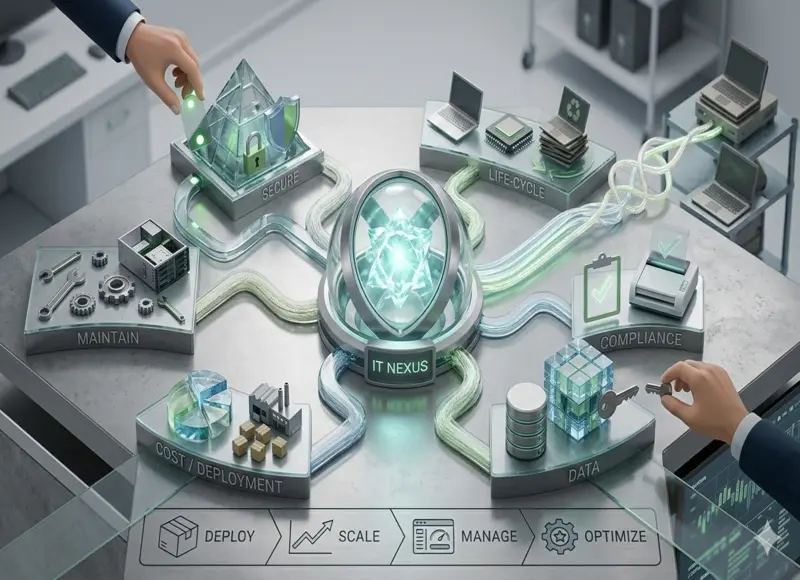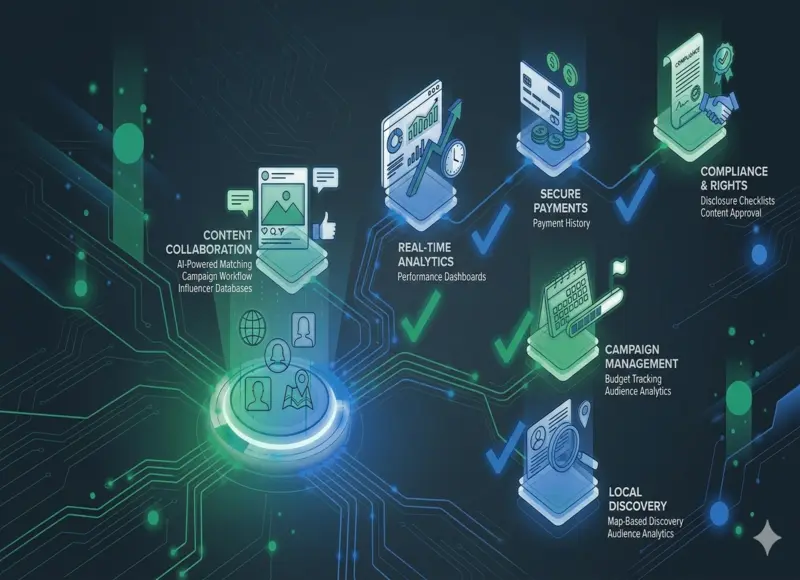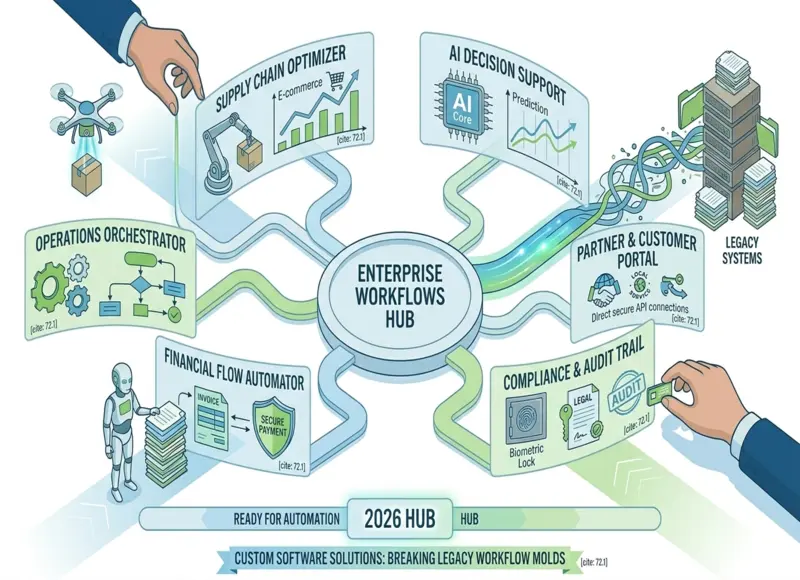Table of Contents
Blockchain is transforming healthcare by providing secure, decentralized systems that protect patient data, ensure privacy, prevent tampering, and give patients more control over their health records.

Protecting patients' data has never been more crucial than it is now, which is only due to the highly technologically dependent healthcare system. Healthcare providers are facing pressure to increase their data security systems, as day by day, ransomware attacks, data breaches, and unauthorized access are becoming common. However, the most well-known innovation of blockchain technology is cryptocurrency, which is now revolutionizing the security of medical industry data.
Blockchain could change the way patient information is stored, accessed, and shared by making data systems that are decentralized, can't be changed, and are easy to view. This article looks at how blockchain is changing the way patient data is kept safe, especially when it comes to healthcare platforms like RCM software, mental health EMR, and mental health billing services.
The Current Challenge in Patient Data Security
Most of the time, traditional healthcare data storage systems are centralized, which means that all of the data is stored in one main server or database. Hackers can take advantage of this centralization because it creates a single point of failure. Recent reports on cybersecurity say that healthcare is one of the industries that gets hacked the most. This is mostly because personal health information (PHI) is worth a lot on the black market.
The situation is made even worse by the fact that more and more people are relying on outside companies for billing, electronic medical records, and scheduling. RCM software and mental health billing services, for example, share sensitive patient information a lot, which makes it more likely that the data will be exposed while it is being sent.
What is Blockchain and How Does It Work?
Blockchain is a ledger that keeps track of transactions on many nodes in a network. There is a chain of "blocks" of information, each one linked to the one before it. This chain is cryptographically secure and cannot be changed. Once a block is added, it can't be changed or deleted without the agreement of all nodes. This keeps the data safe and accurate.
In healthcare, blockchain can be used to keep track of:
- Medical histories
- Insurance claims
- Prescription records
- Lab results
- Treatment plans
Since every transaction is time-stamped and checked by the network, it is almost impossible to change or access it without permission.
Enhancing Security with Decentralized Data Storage
Talking about Decentralization is another interesting thing about blockchain. As compared to traditional centralized systems, blockchain spreads data across various nodes, and each of those nodes keeps a copy of the ledger. This results in the whole network still being safe even if one node is hacked.
For instance, a blockchain network can safely store patient histories and vaccination records in mental health EHR systems. Mental health professionals have access to the information of the patients even if they are getting care in different states or hospitals, safely & quickly. This accessibility helps them to stay updated with the children’s medical records, as the treatment can be carried out even in emergency situations.
Ensuring Patient Consent and Data Ownership
Patient consent is one of the ethical issues that come up when managing healthcare data. Once a patient's medical data is entered into a system, they often don't have much control over who can see it. Blockchain changes the way we think about identity by letting people have their own identity.
Patients can have private keys that are linked to their health records thanks to blockchain. They can also have access if they want to give or take away access to their medical records to their healthcare providers, insurance companies, or labs. This process just makes sure that standard procedures such as HIPAA and GDPR are being followed, and patients' & healthcare providers' trust is maintained.
This approach has been really helpful for sensitive cases such as mental health billing services, where privacy and discretion have been really necessary. Patients with PTSD, depression, or anxiety feel better when they know that they are in charge of their medical record, for it provides access to see their medical information.
Streamlining Data Interoperability
Interoperability, or the accessibility of easily sharing medical information between different healthcare systems, is still a mind-disturbing problem. Different healthcare providers can use different formats or platforms to share information, which increases the risk of mistakes and compromises the confidentiality of the information.
Blockchain can make it easier for stakeholders to share data in real time. Blockchain provides a universal layer of trust, enabling RCM software, mental health EHR, and mental health billing services to securely connect and share encrypted data. For example, an RCM platform could get insurance information that has been verified by the blockchain to speed up the claims process.
A mental health EHR could get lab test results from another system without having to do the same thing twice.
Mental health billing systems could easily check session data from therapists for patients.
This kind of data synchronization makes things more accurate, lessens the workload for administrators, and improves patient outcomes.
Reducing Fraud and Billing Errors
In the healthcare industry, billing fraud is the major scams that cost billions of dollars every year. Blockchain can help to lower the number of scams, by making sure that every billing record is transparent to the patient is who has been changed. As blockchain keeps a record track of every transaction, whether it is from diagnosis to treatment, the billing charges are mentioned during the whole process, and only authorized people can access it.
A blockchain-based system could help mental health billing services by securely tracking insurance claims, medication records, and recurring therapy sessions. It could automatically verify each session’s validity and match it with the patient’s insurance coverage. This would significantly reduce billing errors and disputes between providers and insurers.
RCM software that uses blockchain can verify every service before it’s submitted for payment. This helps reduce rejected claims and speeds up the reimbursement process.
Challenges and Considerations
There are many problems that need to be solved before blockchain can be used in healthcare, even though it has a lot of potential:
1. Scalability
Every day, healthcare systems create a lot of data. Blockchain networks need to change so they can handle these kinds of volumes without slowing down or losing performance.
2. Standardization
There aren't any widely accepted rules for how to use blockchain in healthcare. To be able to work together, different vendors and stakeholders will need to agree.
3. Regulatory Compliance
Even though blockchain is inherently secure, any use of it must still follow local and international health data rules like HIPAA, GDPR, or HITECH.
4. Initial Investment
It costs a lot of money and time to move existing data infrastructure to a blockchain-based system, which might be hard for smaller clinics to do.
Future Outlook
Blockchain is likely to play a major role in the healthcare industry as technologies are getting better day by day & cheaper to use. Emerging technologies such as AI and Internet of Medical Things (IoMT) are making their influence stronger. For instance, AI can be used with blockchain to predict the consequences in healthcare, and blockchain makes sure that AI training data has been correctly inserted.
Apart from that, there are also large-scale pilot projects going on across the world, which indicates that people are getting more interested and confident in technology. Both the large businesses & startups are looking for ways to utilize blockchain technology & secure their data. Just not data security, they are also looking into supply chain transparency, clinical trials, and patient engagement through the blockchain for more up-to-date.
Conclusion
Some of the most significant challenges to data security in healthcare can be addressed with blockchain technology. Blockchain makes it much easier to store and share health data by ensuring that it is decentralized, transparent, and under the patient's control. Integrating blockchain into RCM software, mental health EHRs, or mental health billing services can usher in a new era of safe, patient-centered care.
As healthcare becomes increasingly digital, providers who utilize blockchain-based systems will not only streamline their operations but also gain their patients' trust. As data becomes the new currency, securing it with blockchain is no longer just an option; it's becoming a must.
Recent Blogs
The Role of Artificial Intelligence in Modern Law Firm Growth Strategies
-
03 Mar 2026
-
6 Min
-
79
How Custom Software Companies Help Enterprises Automate Complex Workflows
-
03 Mar 2026
-
5 Min
-
79








